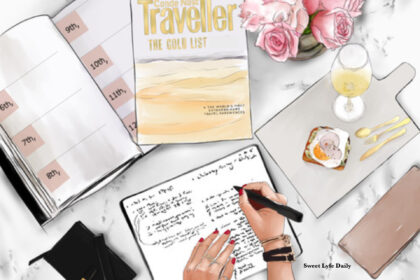This post may contain affiliate links, and Sweet Lyfe Daily may earn a small commission from purchases made through link at no additional cost to you. As an Amazon Associate Partner, Sweet Lyfe Daily may earn a commission from qualifying purchases. Please do your own research before making any purchases. Please click to read our full Disclaimer. Thank you for your support.
Dear Sweet Friends,
So, let’s talk about money and why it is essential to budget in order to meet your financial goals and optimize your financial wellness. For some people, discussing money can bring up feelings of discomfort. Many of these individuals do not really unpack this emotion but rather dismiss it and avoid discussing money altogether.
There are many reasons for this, among them are: (i) in some cultures, it’s taboo to discuss money, (ii) for some, it’s a subject they don’t have practice in discussing, (iii) others have experienced negativity around money, and therefore this becomes a sore subject for them and (iv) there is a level of insecurity around money due to lack of financial literacy.
There are many other reasons, but these are some of the most common. Whether we like it or not, money is an important aspect of our lives. We need it to pay for essential resources such as food, shelter, etc. So avoidance is not a healthy option if we want our money to work for us and also build a healthy relationship around it. One of the most essential ways to start to proactively manage money is through the act of budgeting.
Budgeting does not have to mean frugality at the expense of enjoying life. I have mentioned in a past blog post the concept of fun money. Fun money is money I set aside each paycheck for fun. This can range from going to the movies, eating out, splurging on an item I have been eyeing, saving for a vacation, etc.
I grew up in a family where we did not have much money, but we never felt poor. My parents always provided for us. Our basic needs were fulfilled. We always had food and a roof over our heads. My parents always set aside money for fun and entertainment; this was part of their budget. Since we lived in the city, there was so much access to libraries, museums, and all other kinds of entertainment offered for free or at a discount. To this day, I am amazed at how my parents were able to do all this with their income and not accrue any crippling debt while doing so.
Financial literacy was pretty basic in my family. We were advised to not try to keep up with the Joneses, not to spend more than we can afford, and to avoid credit card debt by all means, use it, and pay off the balance at the end of the month. We also learned that even with less money, there is always room to have a little fun.
While I saw my parents work very hard, they took time out of their schedule for fun, whether it be engaging in activities I mentioned earlier, exploring the city, window shopping, or hosting social gatherings. They did all this while being financially responsible and thus setting an example for their children. This basic blueprint set me up for a healthy relationship with money. In this post, I will share some budgeting tips to save money while still enjoying life.

Why budgeting is important:
A budget can help you get on track or stay on track with meeting your short and long-term financial goals and put you on the path of working towards them. It is a habit that empowers you to take control of your finances and to be proactive versus passive with your finances. Budgeting removes the guessing game on whether you have enough money to cover your basic expenses. It helps reduce debt because it makes you aware of how much you have to spend, so you can limit or stop overspending.
Budgeting helps you to get clear on your spending habits. It shows whether you are spending money on your needs versus your wants. It may also highlight areas where you can adjust your spending and even areas that could be wasteful, such as subscriptions that you may not even use regularly. It also offers insight into your financial habits and how you relate to money, which is an important area to explore. Budgeting is a powerful tool anyone can use to have a sense of organization and control over their financial affairs.
Tip 1: Start from a place of understanding
First, you should always anchor your financial pursuit in the understanding that there is no one-size-fits-all budget for each person or lifestyle. Each person’s needs and wants are personal to them. Therefore, they should create a budget accordingly, a budget that is reasonable and rings true to them. You are the only one who can determine how much money you need to cover your needs and wants and also to feel secure, stable, etc.
I do not believe frugality and restriction are the best approach to budgeting. Similar to restrictive eating, which can trigger overeating, frugality and similar restrictions can trigger overspending for some people. The key is to work on creating a healthy balance with your finances. Understanding your wants versus needs. Understanding how you relate emotionally to money. Becoming financial literate by learning how to make money work for you and how to spend or use your money wisely.
Tip 2: Know your personal numbers. What is your number?
When budgeting, I suggest you start with two calculations. First, calculate how much money you need to cover your basic living expenses. You can calculate this monthly or annually. This is essentially auditing all the money you spend on rent/mortgage, food, utilities, transportation, entertainment, etc. One way to start this is to spend a month tracking your spending. If you are a credit card or debit card user, look at your monthly statements and determine how much you spend each month and what you spend this money on.
The second calculation you should make is determining how much money you need to be financially free. How much money do you need to bring about the life and experiences that will truly fulfill you? This is an interesting question because if you ask many people this question, they may not even be able to tell you the amount or even know how to calculate it. Depending on who you speak with, there are multiple ways people approach calculating this number.
My go-to method in determining this number is by using “The rule of 25 and 4%.” This rule is used by Financial Independent Retire Early (FIRE) community members. While I am not a member, this formula gave me an idea of approximately how much I may need to be financially free and secure. Determining this number has given me a tangible number that I am working towards. It has helped me get clear on what I need to do to get there with the income I receive and investments.

Tip 3: Differentiate your “wants” from your “needs”
One major component of budgeting is differentiating your wants from your needs. Needs are the basic things you can’t live without, such as a place to live and food to eat. Wants are things that are nice to have but not essential to your survival. I would refer to this as the cherry on the top. For example, if you need to sleep, you can choose to sleep anywhere: on the floor, in a chair, or on a bed. In this case, an example of want is to sleep in a bed with a firm mattress and 100% cotton sheets.
You are hungry and need to eat to satisfy your hunger. You can eat anything. However, in this case, an example of want is that you want to eat a hamburger at your favorite restaurant. The wants in these examples are a bit extreme, but my point here is that sleep, eating, or finding shelter are basic needs and can be satisfied in many different ways that will have many diverse ranges in cost. Your want is extra and beyond what it takes to meet your basic needs.
Tip 4: Get Organized. Identify a tool to house your budget
Earlier in this post, I suggested tracking your monthly spending or reviewing your credit and debit card statements. This simple audit of your spending will help you determine how much you are spending each month and what you are spending this money on. There are many ways to create a budget. First, identify a tool to document your budget. This can be on paper or in a book, where you list out all your essential expenses and additional spending. There are many free downloadable budget templates online, or you can use a budget app. There are many to choose from. Check out this article for some specifics on how to create a budget.

Tip 5: Working On Your Money Mindset
If you need to be more disciplined about your budget. You may hear advice such as to resist the urge to splurge. Practice self-discipline and rein in your spending. If there is something you need (as opposed to want), shop around and find the best possible deal. Overall, the gist of all this advice is to make good money decisions and invest in what’s important. All of these are great advice but are not very effective if you have an unhealthy relationship with money. Paying close attention to your spending and the emotions around your spending is really an important part of budgeting and building a healthy relationship with money.
Stress, frustration, and anxiety are all emotions that can trigger avoidance in dealing with your money dilemmas and mindless spending or can even cause you to miss little details, like the fact that you did not pay a monthly bill and end up accruing additional penalties and fees. In the instances where you find that money is flying out of your purse, it’s important to track where it’s going and understand the emotions connected to your mindless- or less-than- responsible-spending.
It is worth getting a deeper understanding of any sense of lack that may be driving your habits. There is no shame here. You are not alone when it comes to experiencing these types of emotions regarding the subject of money.
Tip 6: Enjoy life while budgeting and saving money
You have tracked your spending, found a tool to house your budget, determined your wants and needs, and now know how much money you need to cover your living expenses. You also know approximately the amount of money you need to be financially free. Now, do you have any money left after you created your budget? If so, this is great; you can now focus on saving and investing strategies to build long-term wealth. You can do this by researching, reading many books and articles or watching videos on personal finance to determine what you can do with your surplus.
If you are at a deficit, I would like to preface here that the deficit I am referring to is not related to a lack of earning enough money to pay for your basic needs but a deficit related to poor money management. Not earning enough money to pay for basic needs is a more significant societal issue that impacts many people and is an ongoing problem.
However, these are not the individuals I am writing to. The person I am writing to has disposable income and has determined their deficit is due to overspending and poor money management. I suggest these individuals take a closer look at their budget and spending habits and adjust accordingly. Continue to get clear on your wants and your needs.
Budgeting, for whatever reason, does not seem to conjure up a feeling of joy for some people. Setting aside or earmarking money to make your wealth-building and financial wellness journey fun, exciting, or at least bearable is a great way to infuse joy. The goal here is not to deprive yourself of life’s joys to get what you perceive is your ideal future outcome. You can experience life but also save and budget for the future.
One question I go back to when deciding on how much to set aside in my fun money account is whether what I am giving up now is worth more than what I gain later? It’s a delicate balance to make this determination. I believe in getting clear with your values and taking the path of less resistance when it comes to changing behavior and habits. This is why I recommend starting small, taking a pragmatic approach to your finances, checking out different techniques, and implementing ones that make sense for you and your lifestyle. Set goals and realign as you go. Be kind to yourself and practice self-compassion throughout this journey.
Tip 7: Reconcile how to live in the present and plan for the future. Money, Mindfulness & Your Future Self
Mindful living or Intentional living urges us to live in the present. So, how do we reconcile the concept of living in the present while planning for the future? There is a balancing act of living today in the present and planning for the future, which comes with fear and uncertainty. Some people interpret living for the moment quite literally. They do not consider or plan for the future or even find it important to do so.
This approach to mindful/intentional living may adversely impact their future self. Whether it be a very consequential impact such as not having the savings required to retire or even meeting their basic needs if they are unable to work or just being perceived as disengaged or unreliable due to lack of planning. I wondered about this approach to mindful/ intentional living. I found a video where an audience member asked Eckhart Tolle whether you can plan for the future without losing the present? Tolle, a spiritual teacher and self-help author whose message is that living in the Now is the truest path to happiness and enlightenment, had an interesting perspective on planning for the future.
In response, Tolle distinguished between Constructive/Focused/Applied thinking (he uses these words interchangeably) and what he referred to as useless/ toxic thinking, which he defined as worrying about the future and outcomes that are outside your control. Tolle stated, “Taking care of the future by doing some constructive planning is being present.”
He explained that we lose the present moment once we mentally project away from the Now by imagining how things will play out in the future, such as ruminating on what can go wrong or what the future outcome may look like or be like. Tolle sees the act of mentally projecting into the future as a distraction that does not get us anywhere. While the act of constructive planning can be done within the present. He also suggests giving yourself a time limit or space for this constructive thinking and planning.
Last Sweet Words
Sweet Friends, this is a reminder that you can hit the reset button on your finances anytime in your wealth-building and financial wellness journey. Building long-term wealth may involve re-prioritizing your cash flow many times during your journey. Tending to the root of any unhealthy beliefs and habits around money. Creating a budget and organizing your finances will help you save and reduce stress and frustration around money.
Schedule some time in your calendar for what Eckhart Tolle calls focus/constructive thinking and planning, whether it be 30 minutes or an hour, to plan and organize your finances. Practice staying in the present and avoid focusing on the outcome and things outside of your control. Focus on building a financial future that will get you closer to financial security and freedom, and make sure to earmark money and time to enjoy yourself while on this journey.
Budget Abundantly,
Sweet Lyfe Daily
Let’s Chat: Please ask questions and share your wisdom in the comments. Everyone makes better choices when they’re not thinking in a vacuum.



